Easter’s here once again, so a review of a film with a biblical theme seemed in order.
Now, the confession. The real reason I watched this was because of Stewart Granger, who, though not the main character in Salome, has a decent enough part—and looks great. And I’m not one to miss up an opportunity to watch a Stewart Granger film, even if it has only a passing resemblance to the biblical story from which it draws its inspiration.
In the Bible, Salome is King Herod’s niece and stepdaughter, a woman who dances so well that she pleases Herod enough for him to ask her to choose her own reward—and she does: the head of John the Baptist. Here, Salome (the gorgeous Rita Hayworth) dances before Herod (Charles Laughton) for a very different reason.
A lot happens in the first few minutes of the film. In Galilee, the incendiary prophet John the Baptist (Alan Badel) has been going about preaching the coming of the Messiah. In his sermons, he not just exhorts the people to turn to righteousness, but launches a harangue against Herod and his queen, Herodias (Judith Anderson, of evil Mrs Danvers fame). John the Baptist says Herodias is a wicked woman, an adultress, for she has broken the law of the land by marrying the brother of her husband.
Herodias has come to know of John the Baptist’s seditious remarks through her counsellor, spy and general dogsbody, Micha (Arnold Moss). He’s a slimy character, and both he and Herodias agree that John is a thorn in the side which had better be plucked out soon.
Not so with Herod. The problem is that Herod’s father, Herod the Great, was king years ago when it had been prophesied that a newborn baby would grow up to rule the land—and Herod the Great, in a mad fit of fear and fury, had killed off thousands of newborn boys in an attempt to get rid of his would-be nemesis. And what had been Herod the Great’s fate? He had fallen prey to a vile disease that had eventually claimed his life.
Now Herod—the son and successor of Herod the Great—is worried. His father tried to kill one Messiah, and died a nasty death; if he tries to harm John the Baptist (who may well be the real Messiah), who knows what will happen to him?
On the other hand, turning a deaf ear to John’s ridicule may give the Romans the impression that Herod is tolerating treason. Herod’s in a quandary, and his wise old adviser Ezra (Maurice Schwartz) cautions him against harming John the Baptist. That, says Ezra, would almost certainly spell doom for the family of Herod.
The scene now shifts to Rome, where Salome has been living since she was a child, Herodias having decided that Herod’s court was too wanton and decadent for a princess to grow up in. (What was Herodias thinking? If she thought ancient Rome—orgies and who knows what else—was a good place for a lone girl to live, she must’ve been truly demented).
Anyway, Salome has grown up to be a gorgeous creature, much in love with Marcellus, a senator and a nephew of Caesar’s. Marcellus petitions Caesar for permission to marry Salome, and the result is that an angry Caesar not just turns down the request, but also banishes the beautiful ‘barbarian’ back to her own country.
That’s a bad enough blow for Salome. What’s even worse, her beloved Marcellus doesn’t lift a finger to oppose Caesar. His love for Rome, for his rights as a Roman, and for the luxuries he’s used to, are more important to him than Salome.
So Salome, an unhappy and angry woman who’s embittered and now disdainful of all Romans, packs up her bags and boards a galley bound for the Holy Land…
…a galley which is also carrying to his new post the man appointed as the Roman governor at Jerusalem, Pontius Pilate (Basil Sydney). Also on board is another important Roman, the commander Claudius (Stewart Granger), who’s served in Britain with Pilate. Claudius is now returning to his present post in Galilee, where he’s been on duty long enough to know the land and its people well enough.
As the voyage progresses, Pilate finds reason to doubt Claudius’s sense of Roman superiority, when he sees Claudius giving water to a thirsty slave who’s collapsed at the oars.
There are a few tiffs between Salome and Claudius (she was anti all Romans, remember?), and Claudius’s method of trying to butter her up—in time-honoured tradition of grab-and-kiss—doesn’t show instant results.
In fact, when they disembark from the ship and head inland, Salome is still angry with Claudius, who’s amused and spends most of his time teasing her. There’s a brief episode when he saves her from a poisonous lizard, and she flings herself into his arms in a panic—but recoils as fast. She does tell him why she hates Romans so, but that’s it. It doesn’t make her love him, and they go on their way.
The other important incident is that the caravan of Romans comes across a small crowd of people being baptised by John the Baptist. The Romans attack, but Claudius manages to save John and spirit him away.
That evening, Claudius goes to meet John. We discover that they are good friends, and Claudius believes in John’s prophecy of a coming Messiah.
Claudius tries to persuade John to lie low, but to no avail: John is hotheaded and unmindful of his own safety. He was born to herald the coming of the Messiah; that is his mission, and if he must die fulfilling it, so be it. He will go to Galilee or Jerusalem or wherever he needs to go to preach his message.
They arrive in Galilee, where Salome suddenly finds herself at the centre of much intrigue. On the one hand, there’s John the Baptist, whom Salome hears preaching while on an incognito visit to the town. He derides the adultress Herodias, while urging Salome (whom he’s recognised) to look past her filial devotion to her mother to see the evil beyond.
On the other hand, there is Herodias, who tells Salome that she (Herodias) is staying on in a loveless marriage, while allowing her reputation to suffer, simply because she wants to pass the throne on to Salome. She will do anything for the happiness of her daughter, insists Herodias.
… and all the while, Herodias herself is plotting with Micha. She’s realised that the lecherous Herod is besotted with Salome and will do anything to possess her. Even kill John the Baptist. If Herodias plays her cards right, the beautiful Salome could be used to force Herod into killing John. That this could be distasteful to Salome is immaterial; it will be gain for Herodias, and that’s all she really wants.
Will Salome, devoted to her mother, discover the truth about her manipulative ways before it’s too late? There is much to come—Herodias’s plotting; Herod’s increasing fear of what heavenly retribution may befall him should he harm John the Baptist; and Salome’s own indecision. Whom should she side with? Her mother Herodias, whose happiness is important to Salome? Or Claudius, whom Salome is beginning to love, and who urges Salome to follow John the Baptist? Or should she simply listen to her own heart?
What I liked about this film:
The jewel-like colours of the women’s clothes. Rita Hayworth and Judith Anderson wear some absolutely stunning costumes.
What I didn’t like:
The very sketchily built romance between Claudius and Salome. One minute, Claudius is pulling her leg and she’s telling him she hates all Romans; the next, they’re in love. The chemistry is very minimal.
The last few minutes of the film—hurried and somehow incomplete.
My main grouse with this film is that it doesn’t go deep. There was plenty of scope here for exploring the different facets of human relationships and emotions. I would have liked, for instance, to see—in depth—how Salome reacted to the different people in her life: her scheming mother, her lecherous stepfather, the prophet who foretold the coming of a new religion, and—of course—the strange Roman who was the prophet’s friend. Salome’s tussle between filial love and honour; between spiritual needs and duty towards country; between love and everything else: that would have made interesting viewing had it been shown at something more than a superficial level.
Salome, unfortunately, divides its loyalties instead of focussing on its main protagonist.
Salome is important, but Rita Hayworth’s scenes are mainly restricted to looking beautiful (and doing the Dance of the Seven Veils!), being romanced by Claudius or (unwillingly, on the part of Salome) by Herod, and being distressed on account of Herodias. Rita Hayworth, as an actress, deserved more than this.
Still, it’s an enjoyable film, very easy on the eyes. And the backdrop (Salome was filmed in Israel) is authentic enough.
But: if there’s one thing I think Bollywood is better at than Hollywood, it’s the sensuous dance. Nearly every comment about, and every review of, Salome that I read praised Rita Hayworth’s Dance of the Seven Veils to the skies. It isn’t bad, but I found myself thinking: how would Helen have done this? Or Minoo Mumtaz? Even the not-usually-dancer Shakila made Babuji dheere chalna a very sensual dance. I have a feeling one of these ladies would have turned the Dance of the Seven Veils into something unbelievably seductive—much more than Ms Hayworth could accomplish.

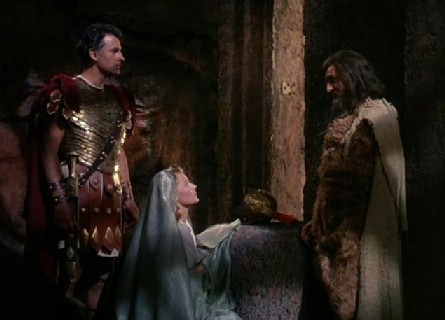



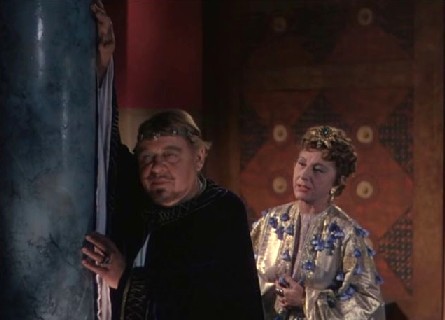
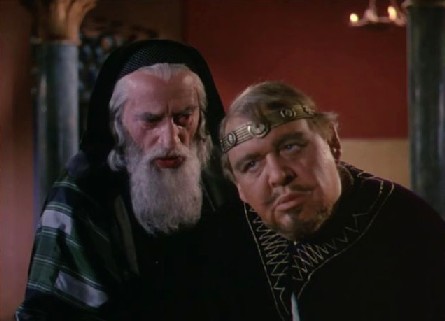
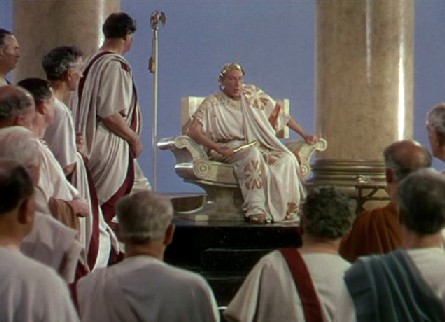
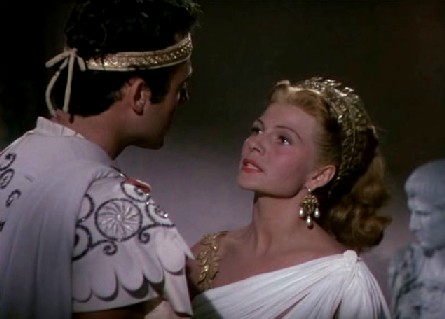
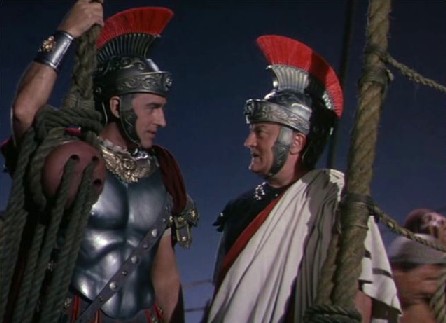
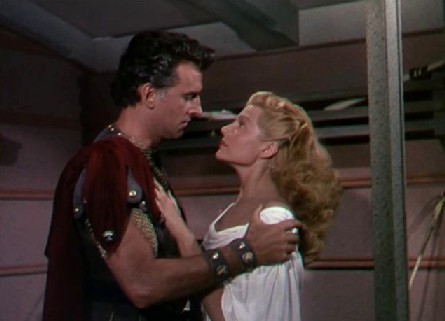

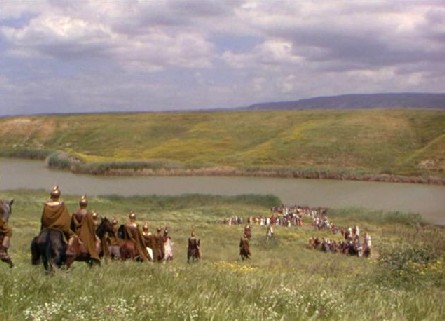





Stewart Granger in mini-skirt! Stewart with greying temples!!!! :-) :-) :-)
OK, now I’ll go read the review…
LikeLike
Uh oh! So “eve-teasing” was rampant in Biblical times, too?
Rita Hayworth seems like a good dancer (the video isnt playing well on my laptop – so I’m not sure), but certainly any Bollywood dancer would have done better. Of course, in Bollywood’s case, the dancers would be assisted by more sensuous music, Asha/Geeta’s luscious voice and some superb lyrics – something that may even have changed the tone of Rita Hayworth’s dancing! For the rest, I doubt if I will be critical of Salome‘s lack of focus on Salome – as long as there is plenty of Granger (and I guess there is), I’ll be happy! :-)
I wish TCM would hurry up and show it soon – I am not particularly keen on spending the $25 + shipping that ebay wants for what will probably turn out to be a pirated disc (like my copy of Moonfleet turned out to be).
LikeLike
I was tickled by the line;
>and Claudius’s method of trying to butter her up—in time-honoured tradition of grab-and-kiss—doesn’t show instant results. :-D
The ‘veil dance’ would certainly have been done justice to by the likes of Helen and co.
But to be fair there were quite a few dances in the early 50s where the dancers danced in a similar fashion.
I always *snort* when I see them stretch an arm out and let fall their hands at the wrist as a ‘dance movement’. :-D
Thanks for the review.
LikeLike
They should have hired an indian choreographer for the dance of the seven veils.
LikeLike
I’m familiar with this story from the bible but in there, she’s just ordered by her mum to do it none of the contemplations and thinking this film seems to show Salome doing, i’ll look out for this as i’m a sucker for biblical adaptations
LikeLike
bollyviewer: And Granger in mini skirt looks better in this (I think) than Granger in mini skirt in Caesar and Cleopatra – plus, of course, he has a much larger role.
Yes, I guess having vocals might have helped a bit (is that one of the reasons Hindi film dances are so much more fun?). May well be.
pacifist: You’re very welcome – and thank you! Now that you mention it, I guess the 50’s (especially the early years, when Helen wasn’t around) were not that great when it came to dancing… Cuckoo, while very good, wasn’t in the same league as Helen was to later be, and that stretched-out arm with the flopping wrist was a ‘dance movement’ that makes even me wince!
thandapani: True! And guess what? The film actually had two dancers – billed as Asoka and Sujata – who do a short performance of what looks like bastardised Bharatnatyam, before Salome comes on.
bollywoodeewana: If you like biblical adaptations, I’d recommend this – nice and entertaining, even if the adaptation is pretty haywire! A film I’d never recommend is David and Bathsheba – Gregory Peck, but a boring film which even he isn’t able to redeem.
LikeLike
Happy Easter!
Wil read the review later!
wish you lots of colourful eggs!
LikeLike
I love the opera by Richard Strauss, based on the same story but primarily on Oscar Wilde’s poem.
It is so eerie and Salome is like a Lolita, crazed on getting St. John’s head! Her aria has a feeling of necrophily.
LikeLike
Thank you so much, Harvey! And happy Easter to you too. (I got to eat some fabulous Easter eggs – chocolate and almond praline. Yum!)
I have heard of the Strauss opera, but never heard – or seen – it. The Salome in that sounds like a more vibrant (even if in a very negative way) version of Hayworth’s Salome. This one’s basically the usual Hollywood princess – beautiful, essentially good, caught between forces, so on and so forth… not especially interesting.
LikeLike
True, any Bollywood dancer would have done it better. But like bollyviewer , as long as there is plenty of Granger (and that too in mini skirt), I’ll be happy! :-)
LikeLike
Exactly! Granger is enough reason to watch a film! :-)
LikeLike
Great review!
We’re linking to your article for Rita Hayworth Wednesday at SeminalCinemaOutfit.com
Keep up the good work!
LikeLike
Thank you! :-)
LikeLike